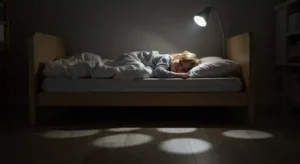Discover how stress impacts sleep and learn Dr. Budhiraja’s TLC method—temperature, light, and calming—to improve your sleep quality and mental resilience.
To better understand the science and solutions behind sleep and stress, we spoke with Dr. Rohit Budhiraja, assistant professor at Harvard Medical School and director of Brigham and Women’s Hospital’s Sleep Clinic in Boston. His practical “TLC” method—Temperature, Light, and Calming—offers simple yet powerful changes to reclaim your sleep, even in stressful times.
Why Sleep Is More Than Just Rest
Sleep is not simply the absence of being awake. It’s an active, vital biological process. While you sleep, your body:
Repairs cells and tissue
Consolidates memories
Regulates hormones
Boosts your immune system
Think of sleep as your body’s overnight maintenance crew. And for your brain, it’s when emotional and cognitive processing happens. REM sleep, in particular, plays a critical role in regulating mood and reducing stress.
“Good sleep gives your brain the space to recover emotionally and physiologically from the pressures of the day.”
But when sleep is disrupted by stress, these benefits are limited—and the effects compound over time.
How Stress Disrupts Sleep Patterns
Stress activates the sympathetic nervous system, also known as the “fight-or-flight” response. This results in:
- Racing thoughts
- Elevated heart rate
- Muscle tension
- Shallow breathin
Even if you’re physically tired, your mind might keep buzzing at night. This overstimulation delays sleep onset and reduces your time in deep and REM sleep, the most restorative stages.
Common stress-induced sleep disruptors include:
- Staying up late to finish work
- Consuming caffeine or alcohol to cope
- Excessive screen time close to bed
- Ruminating over unresolved problems
These behaviors create a vicious cycle, where poor sleep makes stress worse, and more stress worsens sleep.
Dr. Budhiraja’s TLC Formula: Temperature, Light, and Calming
Dr. Budhiraja outlines a simple but powerful three-part strategy to optimize sleep despite life’s pressures:
🧊 T – Temperature
Keep your bedroom cool, between 60°F and 67°F (15°C–19°C). Cooler environments signal the brain it’s time to sleep. Consider:
Lowering your thermostat
Using breathable bedding
Running a fan for airflow and white noise
“Overheating at night can disrupt sleep onset and increase nighttime wake-ups,” says Dr. Budhiraja.
💡 L – Light
Exposure to artificial light, especially blue light from screens, inhibits melatonin production—your body’s natural sleep hormone.
Dr. Budhiraja recommends:
- Avoiding screens at least 1 hour before bed
- Using blue-light blocking glasses
- Installing blackout curtains or wearing a sleep mask
- Enabling “Night Shift” mode on phones and computers
Even dimming your lights after dinner can help your body begin its wind-down phase naturally.
😌 C – Calming
Your pre-sleep routine should signal to your brain it’s time to rest. Avoid stimulating activities and engage in relaxing ones like:
- Gentle stretching or yoga
- A warm bath (not hot)
- Meditation with apps like Calm or Headspace
- Reading a physical book
- Listening to soothing music or white noise
This transition from alertness to relaxation is key to falling asleep faster and staying asleep longer.
Beyond TLC: Building Daily Habits That Reduce Stress
Sleep improvement doesn’t start at night—it begins during the day. Here are daytime strategies that can dramatically reduce the impact of stress on your sleep:
🧠 Practice Mindfulness
Daily breathing exercises or short meditations train your nervous system to respond calmly to stress. Try:
The 5-4-3-2-1 grounding technique
Journaling to offload racing thoughts
Brief check-ins throughout the day to release tension
🗓️ Plan and Prioritize
Break tasks into smaller steps. Avoid late-night work sessions that spike your cortisol (stress hormone) right before bed. Plan your day with:
- Scheduled breaks
- Defined “stop times” for work
- Evening routines that don’t involve screens or email
This reduces decision fatigue and prevents sleep-disrupting habits from forming.
🏃♂️ Adopt a Stress-Reducing Lifestyle
- Get moderate exercise earlier in the day
- Eat a balanced diet and avoid large meals at night
- Limit alcohol and caffeine after 3 p.m.
- Spend time in natural light during the day to support circadian rhythms
If stress continues despite these efforts, consider whether an underlying sleep disorder like insomnia, sleep apnea, or restless legs syndrome is at play. Professional treatment may be necessary.
Conclusion
You can’t always eliminate stress, but you can control how you respond to it—and how it affects your sleep. Prioritizing rest is a powerful act of self-care, and Dr. Budhiraja’s TLC method offers a simple roadmap.
Adjust your environment (T), limit disruptive light (L), and create a calming routine (C). Pair these changes with daily stress management techniques to protect your mental and physical health long-term.
When you sleep better, you live better.
Frequently Asked Questions
How does stress directly affect my ability to sleep at night?
Stress increases arousal, heart rate, and brain activity, making it difficult to relax and fall asleep. It also reduces deep sleep and leads to frequent nighttime awakenings.
What’s one quick change I can make to improve sleep tonight?
Start a “Power Down Hour” before bed: turn off screens, dim the lights, drink a warm, caffeine-free tea, stretch, and breathe deeply. Consistency is key.








